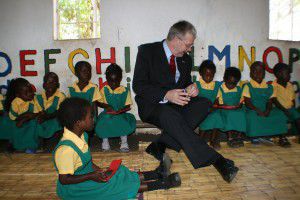A Year in the Life of EuroTalk
There’s no doubt 2012 has been a pretty special year for the UK and the world, but it’s also been quite an eventful one at EuroTalk.
Maths
In January we released a new app, the first in a series to teach maths to primary school age children.
![]()
This is a part of our mission to reach a billion children with fantastic educational apps, to get them off to a great start in life. The most exciting thing about the apps is that we’ll be translating them into 200 languages so they can literally be used by any child, anywhere.
Maths, age 3-5 was an instant hit with parents and children all over the world, and we were delighted with the response. Ever since then we’ve been working hard on the next app, for 4-6 year olds, which has just this week been released to the App Store. The whole series will cover all the years of primary school and we’re really excited about the future!
Malawi
Our work in Malawi has continued this year. In February, Andrew, Jamie, Zane, Alan and RoseMarie, who’s the author of the maths apps, travelled to Malawi to install iPods with the app translated into the local language of Chichewa, in primary schools. They also trained teachers and pupils on how to use the devices. The project is being run in partnership with the Scottish government, and last month Andrew and Jamie returned to Malawi, where they met with Michael Russell, the Scottish Education Secretary. He was delighted with the project so far, which has been declared a success!
Languages
We’ve also been really busy with our language learning programs. In October we released Talk More, Talk the Talk and Talk Business as downloads, as well as the Instant USB, which combines Talk Now and Talk More on one handy and portable USB drive, so it works with all the new computers that don’t have CD drives.
Baby boom!

This year, Zsolt, Olga and Chelsey all welcomed new babies – and brought them in to the office so we could all have a cuddle! Zsolt’s little boy Barnie even became the new ‘face of EuroTalk’ for a while when we posted this photo on our Facebook page.
Arrivals and departures
Sadly over the year we’ve had to say goodbye to a few people as Lotta, Ryan, Katie and Sheila all moved on to new challenges. But we also welcomed some new team members: Fiona, who looks after all our customers (and us) brilliantly; Pedro and Michal, our new app developers; Nat and Alex, who are busy getting our new products translated into hundreds of languages; and Tom, who’s only with us for a year but is already a hugely valued member of the team, helping with customer orders and product testing among many other tasks.
Marathon men – and woman
In October, Al, Franco, Glyn, Jamie, Zane and Zsolt all ran the Royal Parks Foundation Half Marathon in London in aid of some great charities. They all worked really hard training, and of course on the day itself, and are already talking about taking part again next year…
And that’s all for 2012! But we’ll be back in 2013 with more plans and exciting new products. Thanks for reading our blog this year, and we look forward to bringing you more news, opinions and guest posts next year! And as always if you have anything you’d like to share, do get in touch.
Have a great Christmas and New Year, everyone!
Liz and the EuroTalk team
A feast of languages: Shakespeare as we’ve never seen it before
Last Monday, 23rd April, was the 448th anniversary of the birth of William Shakespeare, and marked the launch of Globe to Globe, a series of Shakespeare’s plays performed over six weeks in 37 different languages at the Globe Theatre on London’s South Bank.
On Monday, Troilus and Cressida was performed in Maori by New Zealand’s Ngakau Toa theatre company. Tonight the audience will watch A Midsummer Night’s Dream in Korean. If that doesn’t appeal, how about The Taming of the Shrew in Urdu, Macbeth in Polish or The Merchant of Venice in Hebrew?
 Even though I don’t speak any of those languages, I’m quite tempted to go along. Not only is this probably a once in a lifetime opportunity, but I’m intrigued to see how the plays will translate. Even for a native English speaker, Shakespeare’s language is not always that easy to understand, so is there a possibility that by watching a play and having literally no idea what’s being said, I could just be putting myself in for a couple of hours of mind-numbing boredom?
Even though I don’t speak any of those languages, I’m quite tempted to go along. Not only is this probably a once in a lifetime opportunity, but I’m intrigued to see how the plays will translate. Even for a native English speaker, Shakespeare’s language is not always that easy to understand, so is there a possibility that by watching a play and having literally no idea what’s being said, I could just be putting myself in for a couple of hours of mind-numbing boredom?
Well, possibly, but I suspect not. Just as an opera can still move an audience who doesn’t speak Italian, the point that’s being made with this festival is that Shakespeare’s themes and the emotions he portrays are so universal, they can be shared with an audience almost without words. The Globe website describes it best: ‘Shakespeare is the language which brings us together better than any other, and which reminds us of our almost infinite difference, and of our strange and humbling commonality.’ Perhaps Shakespeare didn’t anticipate that his work would one day be portrayed through a haka (the warrior dance best known outside New Zealand as the pre-match rugby ritual), but does that make it any less valid?
A couple of weeks ago, I watched a fantastic performance of Henry V by the Propeller Theatre Company. A whole scene of the play takes place in French, a language I don’t speak and which I’m pretty sure a lot of people in the theatre didn’t either. And yet – we all reacted in the same way at the same time to what we were seeing. If you’d asked me afterwards to translate every word the character was saying, I wouldn’t be able to. But I can tell you why it was funny.
Whether I could make it through a whole play is another question – but there’s only one way to find out! Now the tough part – which play to go for…? Any suggestions?
Liz
What’s the hardest language to learn?
I remember the first day of my Hispanic Studies degree, when our head of department brought us all down to earth by reminding us that Spanish is one of the easiest languages to learn. Having all worked pretty hard to get there, we were quite offended, but looking back now, I have to admit he may have been right… Spanish follows relatively simple grammatical rules, and once you know the different sounds, you can look at any word, and even if you’ve never seen it before you’ll know how to pronounce it. Of course there are areas of difficulty, like the age-old ‘ser or estar’ debate and (every linguist’s favourite) the subjunctive, but on the whole it isn’t a nightmare to get to grips with.
So that got me thinking: what is the hardest language to learn? Obvious answers that spring to mind are languages like Arabic, Mandarin, Cantonese and Japanese, which use a completely different writing system to English and, in the case of the Chinese languages, rely heavily on tone of voice. Changing the way you say a word even fractionally can completely change its meaning – which makes learning the language seem pretty daunting.
Other languages that I’ve been told are really difficult to learn include Finnish and Hungarian, in this case because of their complicated grammar systems.
Of course this is all from an English speaker’s point of view. If I’d been brought up speaking another language then my ideas about which are most difficult would probably be totally different. I’m sure I’d find English quite hard if I weren’t a native speaker.
What do you think? Have you ever learnt a language that was particularly challenging?
Liz

